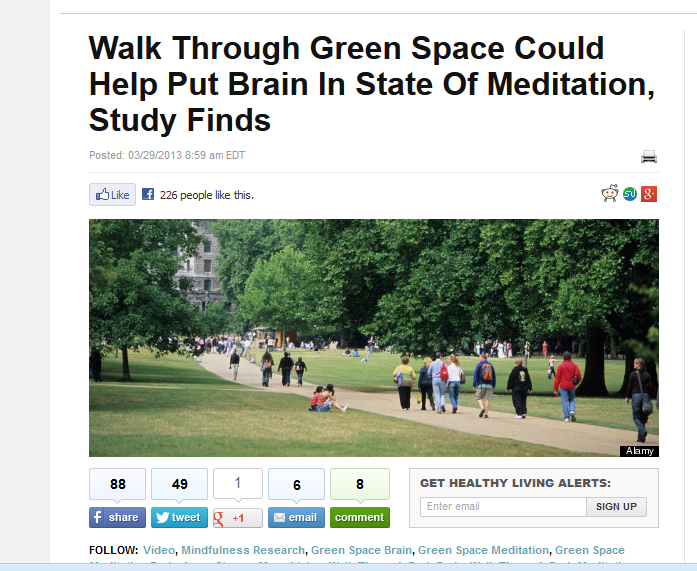Clik here to view.

Snipped from Huffington Post http://www.huffingtonpost.com/2013/03/29/green-space-meditation-brain-walk-park_n_2964199.html
BJSM’s mandate is to promote better health through (i) injury prevention, (ii) excellence in treatment of injuries and medical problems, as well as (iii) encouraging exercise prescription as appropriate at both the primary prevention and secondary/tertiary prevention level.
This blog focuses on this Easter weekend’s attention to the role of green space for mental health. Professor Peter Aspinall from the School of Built Environment, Heriot-Watt University, Edinburgh examined how the brain responded to outdoor physical activity. The Huffington Post did a nice job of summarising the study and you can read that here.
Earlier, Gretchen Reynolds @GretchenReynold – a preeminent exercise medicine journalist and author – had run the story in the New York Times wellness blog.
Why do the BJSM editors (including Deputy Editors Babette Pluim @DocPluim and Jill Cook @ProfJillCook) give a high rating to a submission like this? Because the socioecological model of behaviour change (Prof Dan Stokols, among others) indicates that physical activity must be heavily influenced by external influences; the key not ‘individual motivation’ alone.
Thus, in keeping with the very important ’7 investments’ document – transit options and urban design are two crucial elements for an active community. See this link for the free PDF of the ’7 investments’ document. And all BJSM readers already know that physical inactivity is the biggest public health problem in the world. (Ranked 4th by the WHO but they are forgiven. (over 100 citations in Web of Science for this Blair paper)).
Other BJSM papers relevant to the Built Environment include:
Development of a Walkability Index (how to quantify urban environments for research)
Time to Walk the Talk (editorial on why this area is important)
Validation of Walk Score (a methods study relating to the Google “walk score”)
Other key contributors in this field include Professors Billie Giles-Corti, Fiona Bull and the indefatiguable and immensely prolific James Sallis.
